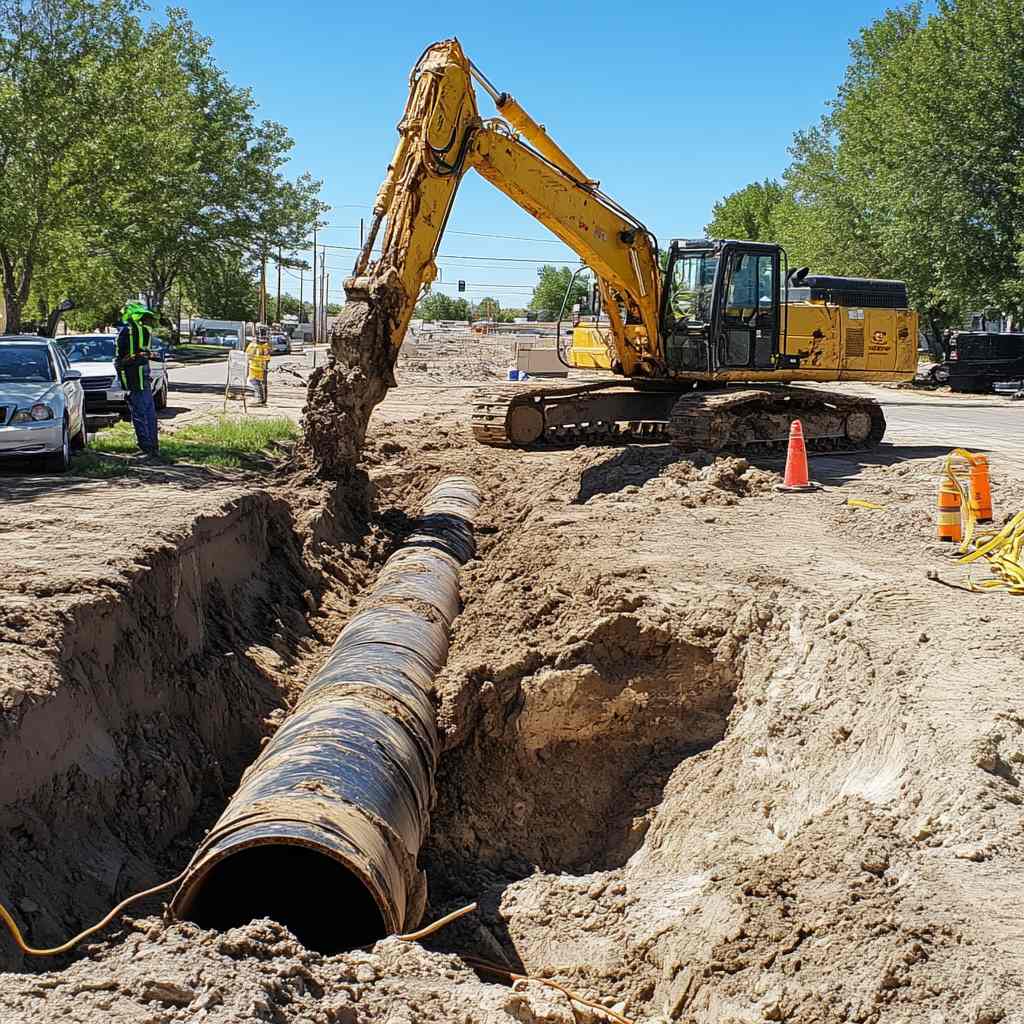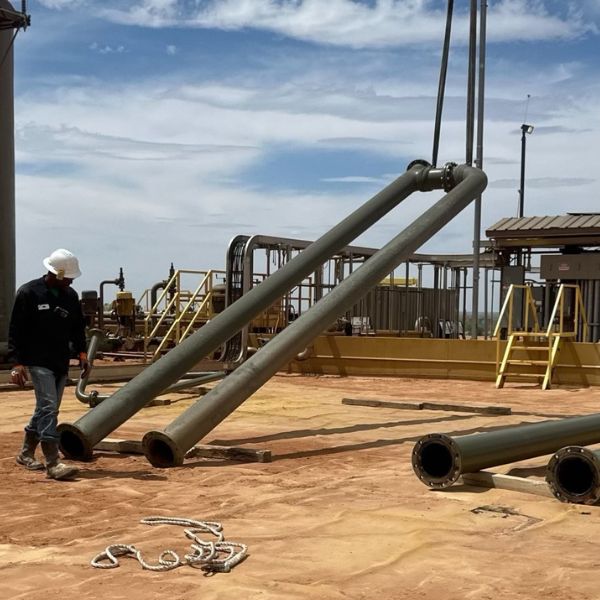Pipeline Construction Services FAQs: What Clients Need to Know
Wiki Article
The Necessary Overview to Comprehending Pipeline Construction Solutions and Their Relevance
Pipeline Construction solutions are basic to the transport of necessary resources such as gas, oil, and water. These services involve thorough preparation and execution, adhering to rigid security and environmental standards. As the sector adapts to contemporary challenges, recognizing its implications and parts ends up being significantly vital. What aspects add to the growing value of these solutions in today's economic situation? The complying with sections will certainly check out these vital facets.Review of Pipeline Construction Solutions
Pipeline Construction solutions include a series of activities vital for the installation and maintenance of pipes utilized to transport different compounds, including oil, gas, and water. These services are crucial for assuring the efficient and risk-free activity of resources from one area to another. The procedure typically begins with detailed planning and layout, which thinks about regulative needs, ecological factors to consider, and logistical obstacles.Once preparation is complete, excavation and grading of the land are performed to prepare the site for Pipeline setup. This is complied with by the real laying of the pipelines, which involves welding or joining areas with each other to develop a constant flow path. After setup, strenuous testing is carried out to ensure integrity and safety. Maintenance solutions are likewise given to attend to any kind of issues that may occur gradually. Overall, Pipeline Construction services play an essential duty in sustaining framework for power and water distribution.
Secret Parts of Pipeline Construction
A successful Pipeline Construction job counts on numerous key components that guarantee the effective and safe installment of the Pipeline system. Initially, comprehensive site assessments are essential, as they determine the ecological and geographical aspects that may affect Construction. Next off, the choice of suitable materials, such as installations and pipes, is important for securing toughness and compatibility with the moved substances.In addition, advanced Construction strategies, consisting of trenchless innovation and directional drilling, boost effectiveness and minimize environmental effect. Reliable task administration is another critical part, coordinating labor, tools, and timelines to meet job objectives.
In addition, communication among stakeholders, including designers, professionals, and local authorities, guarantees alignment on task requirements and requirements. Complete top quality control steps throughout the Construction procedure guarantee conformity with market requirements and maximize the Pipeline's operational life expectancy. Collectively, these parts form the backbone of an effective Pipeline Construction job.
Safety Specifications and Rules in Pipeline Construction

Regulative bodies, such as the Occupational Security and Wellness Management (OSHA) and the Pipeline and Hazardous Materials Safety Administration (PHMSA), stated particular demands that govern Construction practices. These include methods for equipment usage, worker training, and emergency situation response treatments. By carrying out these requirements, Construction business not only protect their employees yet likewise safe public depend on. Eventually, extensive safety steps add to the long-lasting success of Pipeline jobs, ensuring they fulfill both operational and environmental assumptions.
Environmental Considerations in Pipeline Projects

Environmental considerations are indispensable to the planning and execution of Pipeline jobs. These tasks need to evaluate potential influence on environments, water resources, and regional wild animals. Carrying out extensive ecological effect assessments (EIAs) is crucial, permitting stakeholders to recognize and reduce risks before Construction starts.
Safeguarding sensitive locations, such as wetlands and environments, often requires applying particular layout features or different routing to lessen interruption. In addition, Pipeline operators are charged with creating methods for preventing leaks and spills, which can have disastrous effects on the atmosphere.
Involvement with local areas is crucial, as public problems can result in job alterations that enhance environmental security. Conformity with regulations set by environmental companies assures that jobs fulfill sustainability criteria, fostering a balance between facilities needs and environmental preservation. Eventually, resolving ecological factors to consider not only safeguards nature yet additionally promotes area trust fund and project feasibility.
The Duty of Modern Technology in Pipeline Construction
Modern technology plays an important function in modern-day Pipeline Construction, boosting performance and precision. Advanced checking methods enable specific preparation and execution, reducing environmental impact and task delays. In addition, the assimilation of automation and robotics simplifies procedures, lowering labor costs and enhancing security on Construction sites.Advanced Surveying Strategies
Advanced evaluating methods play a crucial function in the effective implementation of Pipeline Construction jobs. These methods leverage cutting-edge technology to assure exact mapping and analysis of the terrain where pipes will certainly be mounted. Methods such as Geographic Information Equipment (GIS), LiDAR (Light Discovery and Ranging), and 3D modeling allow engineers to visualize and assess the landscape, identifying ecological issues and possible challenges. By utilizing these innovative tools, groups can boost accuracy ready and positioning, greatly minimizing the danger of mistakes during Construction. In addition, real-time data collection permits for instant modifications and informed decision-making throughout the job lifecycle. Inevitably, these checking innovations add to enhanced efficiency, security, and sustainability in Pipeline Construction initiatives.Automation and Robotics

Economic Effect of Pipeline Framework
Pipeline infrastructure plays an essential function in forming regional economic situations and helping with profession. By providing a trusted ways of moving oil, gas, and other products, pipes reduce transportation prices and improve supply chain performance. This infrastructure draws in financial investment, stimulates task production, and cultivates economic growth in surrounding areas.Moreover, the Construction and maintenance of pipelines contribute significantly to neighborhood economic climates, developing numerous employment chances in different fields, from design to labor. The increase of tasks usually causes enhanced spending in local businesses, further bolstering economic activity.
Additionally, pipes boost power protection by making certain a steady supply of resources, which is vital for industrial operations and residential needs. As areas come to be interconnected through Pipeline networks, they access to wider markets, raising competitiveness and economic durability. As a result, the economic influence of Pipeline framework is diverse, influencing both immediate local economic situations and broader local advancement.
Future Trends in Pipeline Construction Providers
The future of Pipeline Construction services is evolving in action to technological advancements, governing adjustments, and expanding environmental factors to consider. Developments such as robotics and drones are enhancing inspection and maintenance procedures, improving safety and here are the findings security and effectiveness. Automation is positioned to decrease labor prices and raise precision in Construction procedures. Additionally, the boosting emphasis on sustainability is triggering firms to take on environment-friendly materials and methods, straightening with global initiatives to lower carbon impacts.Regulatory structures are additionally adapting to attend to ecological impacts, pushing for better openness and liability in Pipeline tasks. The combination of clever technologies, including real-time tracking systems, is anticipated to improve the dependability and efficiency of Pipeline networks. As power needs change towards renewable sources, Pipeline Construction solutions will likely see a surge in tasks associated with biofuels and hydrogen transport. In general, these patterns suggest a transformative period for the Pipeline Construction market, concentrated on technology and sustainability.
Regularly Asked Questions
What Types of Pipelines Are Commonly Built?
Different kinds of pipes are generally created, consisting of oil, sewer, gas, and water pipelines - Pipeline Construction Services. Each serves distinctive purposes, helping with the transport of necessary sources throughout regions while sticking to safety and environmental regulationsThe length of time Does a Normal Pipeline Job Take?
The duration of a typical Pipeline project differs substantially, often varying from numerous months to a few years. Factors influencing this timeline consist of job complexity, regulatory authorizations, and ecological considerations that must be addressed.That Controls Pipeline Construction Business?
Pipeline Construction companies are managed by numerous federal, state, and local firms, including the Pipeline and Hazardous Materials Safety And Security Administration (PHMSA) and state utility compensations, making certain conformity with security and ecological requirements throughout the Construction process.What Are Common Products Utilized in Pipeline Construction?
Common products used in Pipeline Construction consist of steel, polyethylene, and PVC. Each material offers distinctive advantages such as versatility, longevity, and resistance to corrosion, making them company website appropriate for numerous applications in carrying liquids and gases.
How Are Pipeline Construction Costs Approximated?
Pipeline Construction prices are estimated by evaluating factors such as product expenditures, labor rates, task complexity, environmental considerations, and regulatory requirements (Pipeline Construction Services). Precise price estimate assurances effective budgeting and task preparation throughout the Construction processPipeline Construction services incorporate a variety of activities Visit Website essential for the installment and maintenance of pipelines used to transport numerous compounds, including water, oil, and gas. A successful Pipeline Construction task relies on a number of key parts that guarantee the safe and reliable setup of the Pipeline system. Advanced evaluating methods play an important duty in the successful implementation of Pipeline Construction tasks. Different kinds of pipelines are generally constructed, consisting of oil, sewage, gas, and water pipelines. Pipeline Construction expenses are estimated by examining aspects such as material costs, labor prices, project intricacy, ecological considerations, and regulative requirements.
Report this wiki page